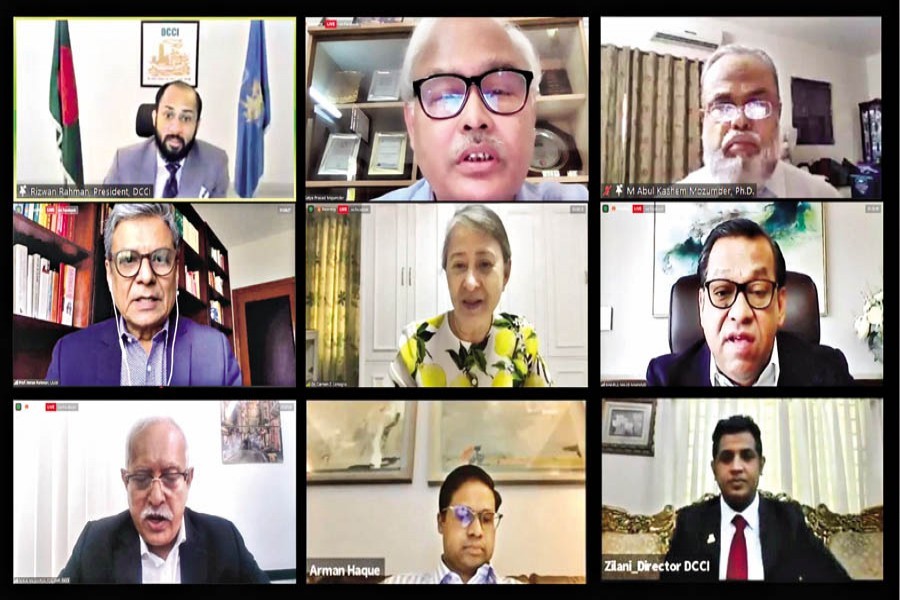Speakers at a programme on Saturday suggested the industries to work closely with academia to create human resource (HR) having specific skill sets that would match with the current and future demand of companies.
Apart from creating required workforce, they also emphasised on better industry-academia linkage for commercialisation of researches and innovations.
The suggestions came at a webinar on "Industry and Academia Linkage: Role of Academia", organised by the Dhaka Chamber of Commerce & Industry (DCCI) with its president Rizwan Rahman in the chair.
Vice Chancellor of Bangladesh University of Engineering and Technology (BUET) Professor Satya Prasad Majumder, Vice Chancellor of American International University Bangladesh (AIUB) DR Carmen Z Lamagna, Pro-Vice Chancellor of Bangladesh University of Professionals (BUP) M Abul Kashem Mozumder, and Special Adviser (Board of Trustees) & Dean of University of Liberal Arts (ULAB) Professor Imran Rahman spoke at the programme while DCCI senior vice president NKA Mobin gave the vote of thanks.
Prof Majumder said that Bangladesh can learn from countries like USA, Japan, South Korea and some European nations on how the business community works with academia to conduct precise researches for industries.
Proper funding from both public and private sources is required for quality researches and innovations at the universities while the university authorities should also modernise curricula in accordance with contemporary and future needs of industries, he said.
He also urged the government and private sector to consider funding researches as a long term investment.
Mentioning that alumni of universities can play significant role in fundraising for their respective institutions, the BUET VC said, "With the help of former students and other fundraisers, BUET has taken an initiative to set up AI, IOT, 5G, Robotics lab to meet future demands for skilled engineers."
He also said an academic body was also formed at the engineering university to modernise curriculum as per the global trends of education.
The DCCI president said that to encourage private financing to academia, the government should waive tax on research and innovation funding like many developed countries.
He also said industries should also advertise about what types of skilled workforce they need for specific companies and such initiative will motivate students to acquire those skill sets.
About the skills mismatch of jobseekers, Mr Rahman said the 4th Industrial revolution-led technological progress, digitisation, SDG centric economic transformation and industrial automation will axe many traditional low-skilled, repetitive jobs.
Besides, due to scarcity of local experts, the foreigners dominate numerous technical and managerial positions of major industries and corporate firms leading substantial remittance outflow from Bangladesh.
Presenting example of Chinese engineering education, he said China became the signatory of 'Washington Accord' in 2013, which enabled Chinese Undergraduate engineering degrees to be 'outcome-based' qualification.
This transformation has become one of the critical factors contributing to the China's industrial modernisation which can be a learning point for local policymakers, he added.
He also suggested introducing a blended Outcome-based-Education (OBE) system encompassing classroom and laboratory-based learning with industrial orientation at engineering and non-engineering education across the board.
Establishing STEM (Science, Technology, Engineering and Math) Research Universities to create quality graduates and Knowledge Parks can also resolve the unemployment crisis, he said.
In a presentation, Dr Lamagna said unemployment rate in Bangladesh is about 4.37 per cent and at least half of them are university graduates.
The industry and academia gap constitutes of curriculum mismatch with the industry standard, lack of working environment for interns, academics without industry exposure, she added.
The government can arrange financial incentives, policy regulations, guidance and support and infrastructure development to foster industry-academia collaboration, she added.
Prof Imran said linkage between industry and academia needs joint initiative while universities should modernise the method of teaching.
Referring to the three aspects of education-teaching, research and career placement, he said that as a whole academia needed to redesign curriculum in line with the demand of 4IR and market demand.
The most important thing is research & innovation in which industry can join hands to inject necessary funds by considering it as an investment, he added.


